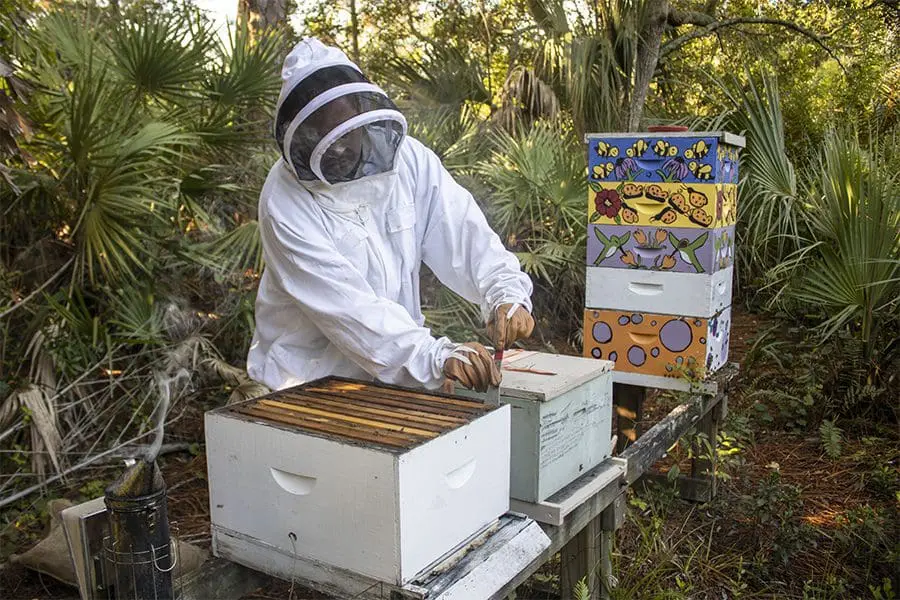

What’s the buzz in the Zoo?
Happy National Honey Bee Day! We’re celebrating by giving you a closer look at our hives – and some of the amazing things we do to maintain them.
Did you know that we have beehives in the Zoo? On your way into our Lands of Change: Australia and Beyond loop, pause before you walk across the bridge and look to your left! An array of colorful boxes make up our hives.
We have two hives currently, and each may contain up to 30,000 bees! These specially designed hives contain different levels, or frames; the bees will build honeycomb directly into each frame, which can be easily moved by beekeepers. We’ve partnered with Brevard Backyard Beekeepers, Inc. to aid in the upkeep of our colony and our beekeeper, Clifton, comes to the Zoo twice a month to check on the hive.
Earlier this week, Clifton and Zoo staff member Justin headed to the hives with two big goals: adding a queen and pulling honey. All bees have specific roles, whether it be to feed the larvae, clean the hive, collect the food or mate with the queen. The queen bee’s role is the most important of them all: to unify the colony and lay eggs!
When a hive doesn’t have a queen, they will attempt to create their own but will be unable to do so successfully. When he noticed that one of our hives was queen-less, Clifton arranged for a new queen to be brought in (and carefully, we might add).
Clifton used a small “clip” to contain the queen, and then placed her on one of the frames in the hive. It appeared as though the colony accepted her and would then remove her from the clip.
Once the queen was placed on her throne (so to speak), Clifton and Justin moved on to the next order of business: pulling honey. They carefully pulled out frames, relocated the bees on those frames, and then added new, empty frames to start the honey-making process over again.
The honey was then processed and spun the next day! Unfortunately, we do not produce enough honey nor are licensed to sell it to the public. However, it does go to good use! Some of the honey is given to our Sea Turtle Healing Center to use as a medicinal tool to heal wounds. Another portion was delivered to our Commissary to make enrichment for our Florida black bears!
Bees are essential to healthy ecosystems and important pollinators for food crops. To help honeybee populations, you can plant pollinator-friendly plants and advocate for (and participate in) using less pesticides.
Brevard Zoo is an independent, not-for-profit organization that receives no recurring government funding for our operating costs. Your generous support enables us to continue to serve our community and continue our vital animal wellness, education and conservation programs.
